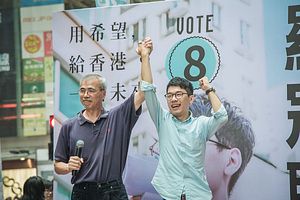The results of the elections for seats in Hong Kong’s Legislative Council have been finalized in what must be a shocking and recalibrating outcome for both Hong Kong’s Beijing appointed government and Beijing itself.
In a previous article, I outlined the 35-seat Functional Constituency and 35-seat Geographical Constituency system that operates in Hong Kong. In short, 40 of the 70 seats are directly elected by a proportionately representative vote. The focus of the elections held on September 4 was largely centered on those 40 seats.
Six new “localists” will now sit in the chamber at the Hong Kong Legislative Council, including Nathan Law Kwun-chung, who became the youngest ever elected legislator on Sunday at the age of 23. Law was a key student leader during the Umbrella Movement. His party, and his political career, only came into being when he and other student leaders came together to form and register their new political entity, Demotistō. Two other newly elected localist legislators, Yau Wai-ching and Sixtus “Baggio” Leung Chung-hang, are from the newly formed political party Youngspiration. Like Demotistō, the party was formed out of the Umbrella Movement. Cheng Chung-tai is from the more militant party Civic Passion, which is a vocal pro- independence group.
Polytechnic University lecturer Lau Siu-lai also won a seat over the weekend. Lau came to prominence when she gave free public lectures on social justice and democracy on the streets during the Umbrella Movement. She continued her free classes under the name of “Democracy Groundwork,” which became the name of her new political party.
Eddie Chu Hoi-dick was a surprising winner, having won the most votes for any single candidate with 84,121 votes in the New Territories West constituency. Chu is a well-known social activist and journalist. His group Land Justice League came into the limelight when they went head to head against the government over the cross-border high-speed rail, which has been slammed as a waste of financial and land resources to appease the Chinese government.
Functional Constituency seats are appointed by industry and social bodies, which have traditionally been overwhelmingly pro-Beijing. To throw another spanner in Beijing’s works, the pro-democracy camp captured two additional Functional Constituency seats to add to their previously held nine seats, winning the Medical and the Architectural, Surveying, Planning, and Landscape seats. This brings the total non pro-Beijing seats to 11 out of a total of 35. The Medical seat was won by the Public Doctors’ Association president, Dr Pierre Chan. The win was likely due to the incumbent government’s insistence on medical council reform which would effectively admit more mainland qualified doctors into the Hong Kong medical system.
Meanwhile, Architectural, Surveying, Planning, and Landscape seat-elect Edward Yiu Chung-yim made direct reference to the maligned chief executive. “My victory is particularly meaningful as the seat has long been dominated by the pro-establishment camp which voted for Chief Executive Leung Chun-ying,” said Yiu after winning the ballot.
The numbers at the final count is 40 pro-Beijing seats, 22 pan-democrats, and eight localists/radicalists. Leung Chun-ying, the incumbent chief executive, has been smug about the outcome, rejecting claims that this election was a litmus test for his public opinion. “The Legco election results have nothing to do with the chances of anyone who aspires to be the next chief executive of Hong Kong,” Leung said. Regardless, he will almost certainly face a tough time lobbying for support from an increasingly fractured council.
This election saw the largest voter turnout in the history of Hong Kong elections. Of the 2.2 million valid votes cast across the 35 Geographical Constituency seats, 19 percent of the votes were secured by localist groups, loosely defined as those who support self-determination for Hong Kong. This is an extremely alarming figure for the Chinese authorities. Ironically, the election results are likely a backlash caused by Beijing’s hardline stance to demands for democracy by the population of Hong Kong.

































